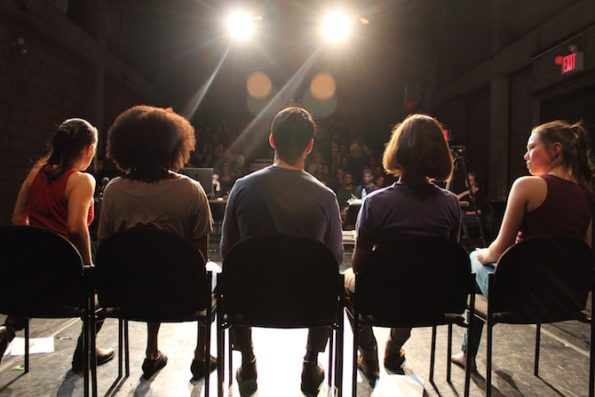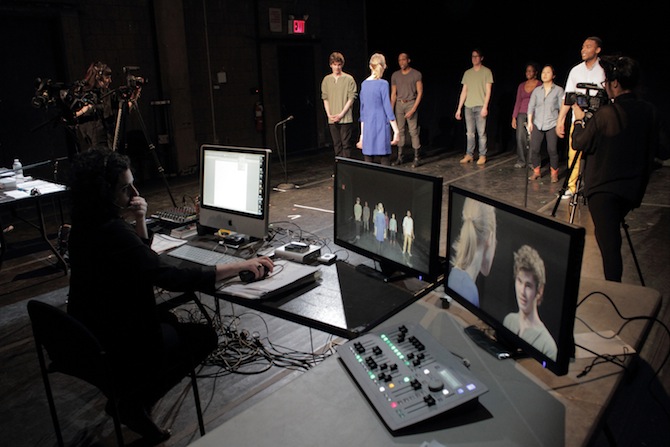Search
To search for an exact match, type the word or phrase you want in quotation marks.
A*DESK has been offering since 2002 contents about criticism and contemporary art. A*DESK has become consolidated thanks to all those who have believed in the project, all those who have followed us, debating, participating and collaborating. Many people have collaborated with A*DESK, and continue to do so. Their efforts, knowledge and belief in the project are what make it grow internationally. At A*DESK we have also generated work for over one hundred professionals in culture, from small collaborations with reviews and classes, to more prolonged and intense collaborations.
At A*DESK we believe in the need for free and universal access to culture and knowledge. We want to carry on being independent, remaining open to more ideas and opinions. If you believe in A*DESK, we need your backing to be able to continue. You can now participate in the project by supporting it. You can choose how much you want to contribute to the project.
You can decide how much you want to bring to the project.

The last weekend in March Itziar Barrio presented a new phase of Los Peligros de la Obediencia, at the Abrons Art Center in New York . This project began in 2010 within the framework of BAD, Bilbao Festival of Theatre and Contemporary Dance . On this occasion, Barrio draws us in to power and seduction with a casting. Four days of selection to choose the four actors who will form part of the following incarnation of this project. The public could assist on the last two days after the initial selection of the actors and actresses had been made.
In 1961, Israel judged and condemned to death Adolf Eichmann, the mastermind who organised the deportation of Jews from Eastern Europe and who was hunted down in Argentina; two years later, Stanley Milgram made public his investigations, in which he evidenced obedience to power: any subject is susceptible of infringing pain on others, following given orders. Milgram confirmed scientifically what Hannah Arendt had advanced in her polemical chronicles about the trial of Eichmann for The New Yorker. According to Arendt, Eichmann was the perfect bureaucrat, obedient to power and efficient in his work. A perfectly normal person, who just wanted to participate in something, to be part of a group and a project.
In Casting: The Perils of Obedience, the public enter one of the theatres of the Abrons Art Center, where the actors are already on stage improvising. The space is presented bare, apart from a few desks and cameras that surround the action. The acting continues, in pairs; all together; in silence, with music (by Krit and the Nirvana song Smells Like Teen Spirit)… until the director orders them to stop and begins a round of interviews. Some questions are repeated; “Why do you want this job?” “Are you a good liar?” “Have you ever broken the law?”; others are added or vary according to the answers. The actors reveal their sexual identities, their past errors, promises, fears and regrets, their past. One by one they pass in front of the camera. Once this round is over, together they improvise some scenes taken from Basic Instinct, Reservoir Dogs and All About Eve. The public abandons the theatre while the casting carries on inside.

In this piece the working method becomes the situation created. The roles of power multiply; Barrio is in control of the cameras, Nigel Smith of the actors and Arnold Mungioli of the casting. The audience enters and takes control as a silent mass and leaves whenever Itziar Barrio chooses. Gazes are cast from different positions: two monitors bring us closer to hands and faces, the working team is left exposed; the public oscillates between morbid fascination and empathy, unleashed by the vulnerability of the actor/subject. An experience that examines the conventions, codes of conduct and forms of social acceptance, that we are all irredeemably bound by.
Barrio has it all recorded, tears and all. This material will be edited as a video and the following phase of the project, the construction of a scene in real time by the selected actors and actresses, will be carried out in 2014. Behind the scenes she confesses that it’s the first time she has depended so much on communication, that’s what going live and ‘open calls’ involvest.
Casting: The Perils of Obedience explores different levels, evidencing the mechanisms of repression and perpetuated obedience in the hierarchies of any structure. That similar tension, that heeding a constant rhythm, reoccurs in different contexts and relations. The actor wants to be chosen, wants to form part of the project and seduces the directors. Sharon Stone maintains the fatal attraction, Eve feels adored by the stalls. The scenes reproduces these tensions; there are leaders, anti-leaders, navigators, soldiers and discussions, that as in Reservoir Dogs, revolve around the system of tips with which waitresses all across the United States earn their living. Working conditions in a perverse system, that at the same time reverberate in the very situation created by this performance/casting/video.
The iconic nature of the references pays heed in turn to the dominant society, the collective fantasy that we project, creating our own fictional alter ego, where cinema plays a definitive role. In some way, we have all experienced this transfer of emotions betwixt screen and life, how at certain moments, images or melodies become tactile and skin-deep. A mechanism similar to that of the method of Stanislavski, that was very influential in North American film, through Lee Strasberg and the Actors Studio. According to which, the actor must seek an experience from his past that will help him in his work, reliving the experience. The actor takes control of his emotions and with a bit of luck, retains his sanity.
With this piece Barrio continues working in the divide between fiction and non-fiction, in a game that captures the public in an unexpected situation, where it becomes difficult to distinguish what is real: the personal stories where the actors and actresses reveal their true selves from the established structure that strips away the processes that power inhabits, and between them love and desire. As Eve would say: Knowing that every night, hundreds of different people love you, smile at you, a twinkle in their eyes, that you’ve pleased them, they love you, you belong to them. For this alone it’s worth it”.

Xavier Acarín is fascinated with experience as the driving force of contemporary culture. He has worked in art centres and cultural organizations both in Barcelona and New York, focussing in particular on performance and installation.
"A desk is a dangerous place from which to watch the world" (John Le Carré)